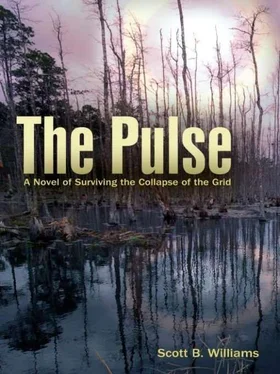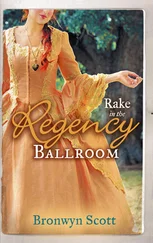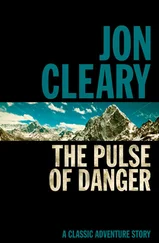At the edge of Lake Pontchartrain, the broad northbound and southbound lanes of the boulevard disappeared and the roadway transitioned into two separate, parallel bridges, with two lanes going north and two going south. Low concrete retaining walls bordered the edges of the lanes on either side, allowing a good view of the water from the height of a bicycle seat. The three of them pedaled onto the bridge, leaving land behind for an open horizon of empty water for as far ahead as they could see. Driving across the Causeway was about as close as a person could get to being out at sea without a boat, and Casey had found it interesting the few times she’d crossed it, especially in the middle sections of the span where no land other than the bridge itself could be seen in any direction. She had never dreamed of riding across such a bridge on a bicycle, and knowing how long it seemed to take in a car, she felt a good deal of apprehension about pedaling such a distance.
Grant said he thought it was okay to stop once they’d ridden about half a mile onto the bridge. He was visibly more at ease now that they had this small bit of isolation between themselves and the streets of the city. Casey and Jessica followed his lead and leaned their bikes against the rail. They all drank from their water bottles and sat in the shade of an abandoned delivery van to get some relief from the hot concrete. The three shared peanut butter and crackers, some dried fruit and almonds; Casey and Grant ate some of the beef jerky Grant had bought at the store. Grant said they would have a hot meal later that night when he felt they had gone far enough to camp safely. High-energy snacks would get them through the miles until they could rest.
As they sat there eating, an occasional car or pickup motored by headed north, and one young couple on expensive touring bicycles with a covered baby carrier hitched behind the man’s bike made their way by as well. The trailer was occupied not by a child, but rather by a small dog that looked to be some sort of schnauzer.
“They’ll probably be eating him before this is over,” Grant said. Seeing Jessica’s expression of horror, he felt bad about bringing it up. “Well, they eat dogs in a lot of other cultures,” he explained. “It’s weird how we have such a strange attachment to some animals while we slaughter others. What’s the difference really, between a dog and a pig?”
“Dogs are cute!” Casey said. “That’s what.”
“I know. Man’s best friend and all that. But still, they are just another variety of animal that our particular culture has chosen to live with as pets rather than raise as meat-producing livestock like pigs or cows.”
“That’s why I don’t eat meat,” Jessica said. “There’s not really a difference and it’s not our place to decide which species are better. All animals have a right to live, just like we do.”
“Agreed!” Grant said. “Except that it’s not a right. Humans are the only animals able to comprehend such complex concepts. In the animal kingdom it’s all about survival of the fittest. We just happen to be at the top of the food chain—for now. In the overall scheme of things, we haven’t always been, though, and we’re still not in some places, like out there.” He pointed to the empty expanse of sea over his shoulder. “In the sea, it’s all about who’s the biggest and who has the most teeth. Now, I’m afraid a lot of people are going to see that survival of the fittest applies to us, too, once you take away all the technology that has made our lives so easy. I’ll never forget how my first undergrad anthropology professor put it. He said if you compared the entire span of human history to the span of a single twenty-four-hour day on the clock, then the advent of the Industrial Revolution would not occur until about five minutes to midnight.”
“Really? I never would have thought about that,” Jessica said.
“Interesting, isn’t it?”
“I feel like survival of the fittest is already about to apply to us,” Casey said. “I’m not looking forward to riding all the way across this bridge.”
“Me either. It already hurts just to think about getting back on that bicycle seat. I don’t think I can go much farther today.”
“You both are doing just fine. We’ll take it easy and stop as much as we need to.
If we have to keep going after dark, that’s fine too, but I want to get past the main navigation channel under the bridge before we stop. There’s a drawbridge there, and if for some reason the authorities decide to open it, we’ll be screwed. I’ll feel a lot better if we camp on the other side of it, even if we are still on the Causeway.”
“How far is it to the drawbridge?” Casey asked.
“It’s closer to the north shore, really, I think about two-thirds of the way across. So figure maybe 15 or 16 more miles.”
“Ugh! That’s a long way.”
“You can do it. We’ll find a place to camp after we pass it and sleep long enough to be refreshed for tomorrow. We should easily be able to push past Mandeville and Covington in the morning and get out in the country, where I’ll feel a lot safer.”
“I hope you’re right about that,” Jessica said. “Places like that scare me. When I think of rural Louisiana and rural Mississippi, all I can picture is a bunch of rednecks with guns.”
“Well, there are some rednecks there to be sure, and most people out there have guns. But those are the kind of people who generally won’t mess with anybody who is not messing with them. As long as we’re not trying to steal something or trespass on somebody’s land, we’ll be fine. I know you’re from California and all, but it’s not quite like Deliverance down here.”
Grant got them back on the bikes before they had time for their tired muscles to cool down and stiffen. They continued north on the bridge as the late afternoon sun began to sink, casting a glaring reflection on the watery horizon to their left. Casey couldn’t imagine doing something like this on her own, without Jessica’s company and Grant’s encouragement and guidance. She wondered as she rode what she and Jessica would have done if he had not offered to help them, and she still wasn’t quite sure why he wanted to be burdened by them. She guessed that without him, they would have just stayed put like almost everybody else and waited—but for what? If Grant was right about all the things he’d told them, life in New Orleans would be a lot harder than riding a bike 90 miles. She didn’t want to think about the entire distance, but the least she and Jessica could do was make their best effort, considering all he was doing to help them. She gritted her teeth and focused on riding 15 miles; just 15 more miles and then they could stop for the night, eat something, and get some sleep.
Before they reached the drawbridge they crossed three smaller navigation channels where the Causeway rose to elevations ranging from 22 to 50 feet to allow the passage of smaller recreational vessels. At each of these places, the roadway rose in a steep hump that forced Jessica and Casey to get off their bikes and push, while Grant shifted to his lowest gear to spin along at a speed that matched their walking pace. They reached the crest of the second and highest of these elevated spans as the sun was beginning to set over the water in an impressive display of reds and golden yellows.
“I don’t think I’ve ever seen a more beautiful sunset,” Jessica said.
“Sunsets over the water are the best,” Grant agreed.
“It sure makes me miss my dad,” Casey said. “I just hope he’s okay. I hope they found their way safely to land and that things in the islands are not as bad as they are here.”
Grant was about to reply when they all became aware of a distant roar of engines to the south, in the direction of the city but obviously much closer, as they were now a good 12 miles from the south shore. The sound was growing louder, and it became clear that it was coming their way. From their vantage point on the elevated section of the bridge, they were soon able to see movement, and moments later that movement was distinguishable for what it was—a long line of motorcycles—winding among the stalled cars and trucks and coming their way at a rapid pace.
Читать дальше












